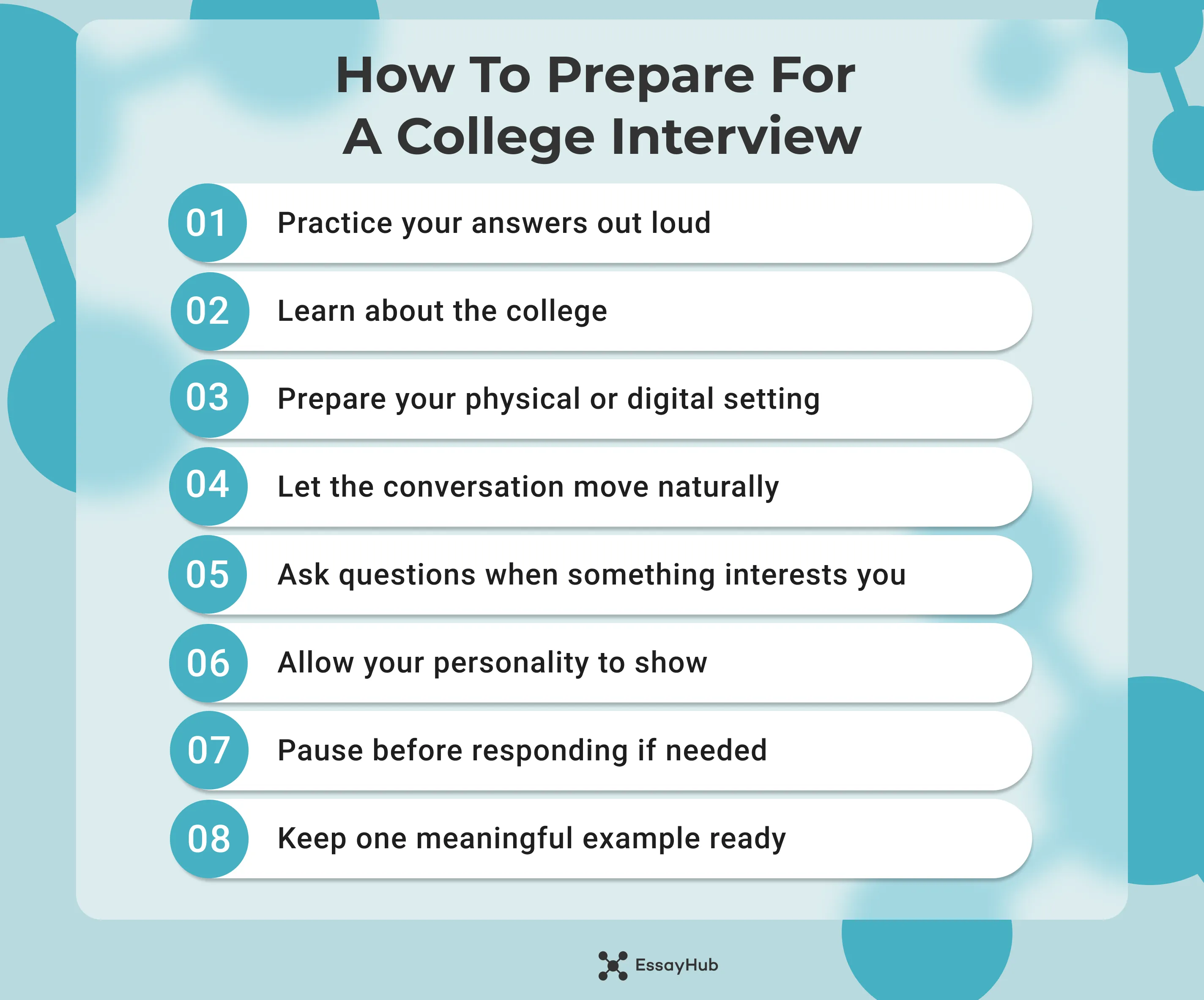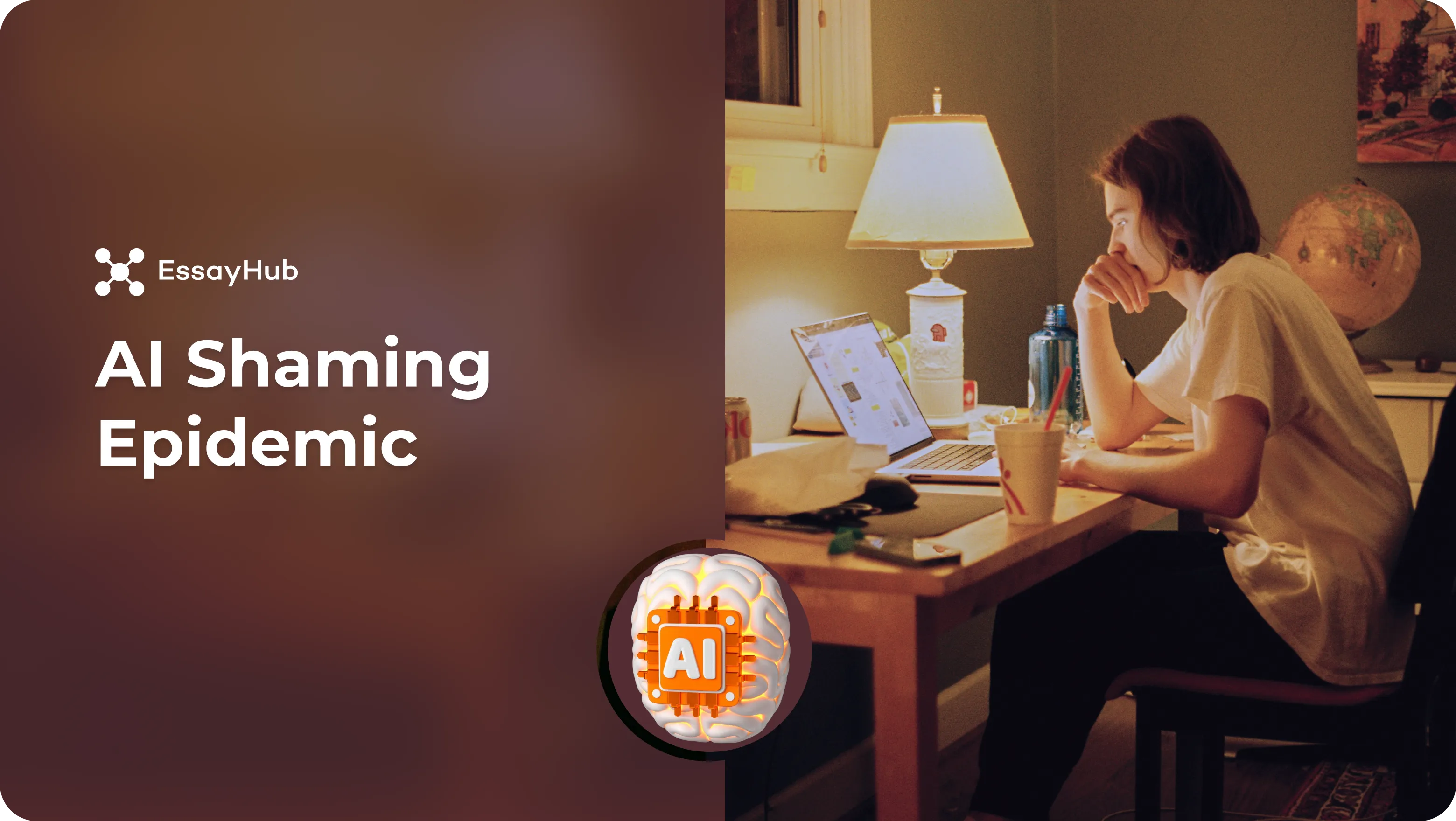The pressure of applying to college settles in the chest and stays there until the answer comes. The interview is one of the main reasons for this tension because it requires quick thinking and real self-expression. Unlike a written essay, the words here land as they come.
This guide will give you a list of some common college interview questions and several options on how to answer each. This way, you'll easily learn how you can guide the conversation yourself. And in case you still have application essays due while you're busy with interview prep, an essay writer from EssayHub can take some load off your shoulders.
The Real Role of College Interviews
Test scores and coursework show your ability, which is undeniably important, but a college interview gives the admissions team a chance to meet the person behind the application.
Admissions officers ask college admissions interview questions to understand your experiences, aspirations, and the interests that keep your attention. But ultimately, this conversation is only one small part of the entire application. The officers make the final decision based on the essay you write, your academic achievements, and the application essay combined.
Speaking of writing, check out our guide on how to write a college admission essay. We hope that understanding the ins and outs of this process will help you stress a bit less.
15 College Interview Questions With Best Answers
Most interview questions revolve around familiar topics. Admissions officers want to understand your experiences and interests, but above all, they want to see how self-aware you are. Speaking naturally works better than performing in an interview because the goal is not to impress, but to sound like a thoughtful person who reflects on their experiences.
Here are some steps on how to handle college questions and answers.
1. Introduce Yourself Briefly
This question just asks you to tell the officer about yourself. They want to hear how you describe your life honestly, without exaggeration. A few details are enough here, including:
- Where do you come from;
- Something you enjoy doing;
- A moment that influenced you.
Think of how you'd explain yourself to someone you met in a casual setting. Keep it steady and sincere. Don't rush to prove anything. Just show what feels true.
Sample Answer: I grew up in a family that valued long conversations, which taught me to speak clearly and leave space for others to reply. That helped me feel comfortable working with groups, which is why I joined theater productions at school. Working on a play taught me how people support each other to reach a shared goal. Later, a park cleanup project introduced me to environmental science, and I want to study it more seriously.
2. How Can You Describe Yourself Using Three Words?
This question looks simple, yet it asks for awareness. The words themselves matter less than the reasons behind them. Choose words you can support with small, real-life examples, as vivid details carry more weight than general descriptions. The interviewer wants to see if your description matches how you actually move through a day. The only thing you should focus on here (and in all other questions) is sounding truthful.
Sample Answer: I would choose curious, patient, and supportive. Curiosity shows up when a topic stays in my mind after class, and I look for more examples in everyday life. My sense of patience developed during assignments that required time rather than quick results. I learned to move through slow progress without frustration. Supportive fits because I notice when classmates feel stuck or uncertain, and I try to make the space feel easier to work in.
3. What Are Your Strengths and Weaknesses?
This question focuses on how you grow. Everyone has a trait they're proud of and another one that they still have to work on. The interviewer wants to hear real examples that show your willingness to improve. The strength you choose should show up naturally in your life; the weakness should be something you have taken actual steps to get better at. The answer should feel like you are talking about your own life, not a model answer.
Sample Answer: Time management feels like a steady part of who I am. I write assignments and upcoming tasks in a notebook so I always know what needs attention. It keeps my days structured. I have been working on speaking more during class discussions. I used to hold back and wait for the perfect idea. I now share one clear thought each time the class discusses something. The words come more easily now. I feel more present and involved because of this.
4. What Challenge Did You Work Through?
The overcoming challenges question reveals how you respond when progress does not come quickly. The story does not need to be dramatic. Slow improvement can leave a deep mark. The interviewer wants to hear how you adjusted your habits. You can mention smart goals examples to show how you broke a large difficulty into smaller daily actions. The shift does not need to be sudden. It can unfold slowly.
Sample Answer: I struggled with algebra for a long period. I kept to my daily practice plan and even met with a tutor once a week. When I worked through each chapter one section at a time, the material began to make sense. The confusion eased, and I learned that progress sometimes comes through steady repetition.
5. Who Is Someone Who Influences You?
This question points to the values you pay attention to. The person you choose does not need to be famous. It helps when you have seen their behavior up close. The interviewer wants to understand what you learn from them and how that learning shows up in your choices. Speak plainly and avoid broad statements about character. Focus on one or two traits you have personally witnessed.
Sample Answer: My grandmother influences me. She checks on neighbors without calling it charity and follows simple routines that keep her day steady. I watch how she speaks with care, even when tired. This kind of consistency from her feels steady. I learned from her that kindness does not necessarily need a spotlight.
6. Why You Want This College?
Admissions officers ask questions like this to let you show genuine interest. The interviewer wants to hear something specific rather than a broad compliment. Mention something in that specific college that connects with what you're already interested in, like a program, a research opportunity, or a community project. The interview focuses on how you see yourself living and learning here.
Sample Answer: I am drawn to the environmental field projects here because this work connects to local ecosystems, and I want to learn through direct observation. I also appreciate smaller discussion-based classes. I learn best when I can ask questions directly. I see myself involved in research groups that study local water systems.
If you face heavy writing loads during the application process, buy college papers to get professional help when deadlines pile up.
7. How You Might Be Part of Campus Life?
This question explores how you connect with others. You do not need a long list of clubs or activities, just one or two ways you naturally participate in communities. The interviewer wants to understand your presence, not your schedule. Think of times you helped organize a group effort or supported someone in the background without announcing it.
Sample Answer: I see myself joining the volunteer group on campus because I feel grounded when working on helping the local community. I also used to start weekly study sessions in a shared space like the library. Studying near others keeps the work steady, even when no one speaks much. It feels easier to focus when the room is shared. I like being part of places where students help one another without needing recognition for it.
8. Where do You Picture Yourself in Five or Ten Years?
This question asks you to talk about where you imagine your interest moving. And this doesn't mean that you need fixed achievements by any means. A direction about where you see your life developing over time matters a lot more. Name what attracts you and describe the kind of life that grows from that pull.
Sample Answer: I picture myself working in environmental conservation because I want to study how certain habitats function and help protect them. I imagine days spent outdoors gathering information and days inside organizing what was found. I also want to teach local groups about the environments near them. People care more when they understand what they are connected to. I want my work to stay close to daily life, not far away from the places people actually live.
9. Which Class Stood Out to You The Most?
Many students have one class that sticks in their memory. The interviewer wants to hear about those ones and what they had that stayed in your mind. Choose one specific class and focus on how it influenced your thinking or interests. But make sure you don't speak negatively about other classes or teachers. A thoughtful explanation shows you notice your own learning process.
Sample Answer: My favorite class was history. The discussions opened a sense of connection between past and present. One lesson focused on how families in ancient cities organized their daily routines. That detail stayed with me because it showed how certain patterns hold a society together. I began paying attention to similar patterns in my own surroundings, like how people gather at certain times or settle into familiar routines. The class made everyday life feel part of something larger and older, and that feeling has remained with me.
10. How Do You Spend Free Time?
This question shows your natural interests when no grades are involved. The interviewer wants to understand what you like to do when you have time to yourself. Choose one or two activities you genuinely return to and avoid listing every hobby you have. You should be mentioning something that reveals how you restore your energy and connect with your surroundings.
Sample Answer: I spend a lot of time drawing places I see every day. I take a notebook with me and sketch street corners, trees, or a window I pass often. The act of drawing slows my attention. I notice shapes, shadows, and small shifts in light that I usually overlook when I move quickly. It gives me a sense of focus. The drawings are simple, yet the habit changed how I move through familiar spaces. I feel more connected to my surroundings because I look at them more closely.
11. What Book or Movie Stayed With You Recently?
When the interviewer asks this question, you need to choose a book or a movie you truly spent time thinking about. The reflection is what matters here: you can mention how the story connected to your feelings or to something happening in your life. You can browse some must read books for college students if you're looking for the next inspiring story.
Sample Answer: I recently read The Song of Achilles, and the story stayed with me for a while. The relationship at the center of the book felt deeply human. The characters cared for each other with devotion you don't often see. The writing made me slow down and pay attention to emotional detail. I found myself thinking about how people influence each other through loyalty and presence. The book lingered in my thoughts long after I finished reading it, which is something I appreciate in stories that stay close to the heart.
12. Can You Describe a Time You Worked With Others?
This question shows how you participate in shared effort. The interviewer wants to see awareness, patience, and cooperation. Choose a real situation where you contributed to something larger than yourself. Avoid general statements about teamwork. Describe what you noticed, what you did, and what changed for you.
Sample Answer: I worked on a school theater production where my role took place backstage. I handled timing cues and small set changes. The work required coordination. I watched how each person depended on others to create a smooth performance. The experience taught me to pay attention to small signals, like a glance or a shift in pace. I learned how to support the group without needing to be seen. The shared effort felt steady and meaningful, and I carried that approach into group projects afterward.
13. What’s One Thing You Would Change About Your School?
This question explores how you view shared environments. Choose something real and reasonable. The interviewer wants to see thoughtful observation, not complaints. Focus on a change that would help students feel more supported or more connected.
Sample Answer: I would add an outdoor study space with shade and simple seating. Students move through long days, and a calm place outdoors would help them reset their attention. I imagine a courtyard where people can read, talk quietly, or pause between classes. Fresh air changes the day and gives the mind space to settle. A setting like that would support focus and well-being in a gentle way that students would feel across the year.
14. What You Would Do With $1,000 or Lottery Funds?
Where you plan to allocate unexpected resources reveals what you truly value. The interviewer wants to hear what feels meaningful to you. Choose something that supports your learning, your community, or your growth. Avoid answers focused on luxury or impulse.
Sample Answer: If I received $1,000, I would use part of it to buy field guides, simple equipment, and transportation for environmental study trips. I would save the rest to visit a nature reserve or research site connected to the topics I want to learn about. I learn most deeply when I am physically present in the place I am studying. The experience of being there stays with me. The funds would help create a moment of real learning that shapes how I understand the environment around me.
15. Do You Have Any Questions?
This question checks your engagement. Ask something that shows you are picturing yourself on campus. Avoid questions easily answered on the college website. Focus on daily life or the learning environment.
Sample Answer:I would like to know how students usually find study partners during the first weeks of the semester. I would also like to know which spaces on campus tend to become gathering places for students who enjoy quiet conversation or shared work. These questions help me imagine the everyday feel of the campus. I want to understand how students build rhythm and connection in their routines.
More Questions You May Come Across in College Interviews
Interviews move through different layers of who you are. Some questions look at your background. Some focus on motivation or curiosity. Others explore how you respond to real situations. Looking over a wide selection of interview questions for college students helps you enter the conversation with familiarity and ease.
Opening Questions About You
These typical college interview questions warm up the conversation and let the interviewer get a sense of how you speak about your life.
- How would you describe the place where you grew up?
- What is something you realized about yourself this past year?
- Who shaped your approach to learning the most?
- Which moment in high school feels meaningful to you now?
- How do you handle your first day in unfamiliar groups?
- What helps you stay focused throughout the week?
- When did you decide college felt like the right step?
- What role does curiosity play in your choices?
- How would your closest friend describe your presence in daily life?
- What do you hope others notice when they speak with you?
Questions About Personality and Character
These questions invite you to talk about how you experience being yourself and how you move through relationships and responsibilities.
- How do you respond when tension rises in your day?
- What brings a sense of grounding when life gets full?
- Which topic absorbs your attention without effort?
- How do you approach disagreements with care?
- What helps you feel steady in group settings?
- Which environment supports your best thinking?
- How do you show care for friends?
- What does personal responsibility mean to you?
- What small habit helps your days run smoothly?
- How do you feel in quiet moments when nothing demands your attention?
Questions About Your Fit With the College
These questions explore how you picture yourself on campus and what draws you toward this particular place.
- What first caught your eye about this college?
- Which academic area here feels closest to your interests?
- How do you imagine your first few weeks on campus unfolding?
- What kind of classroom environment supports your learning style?
- Where do you see yourself participating in campus life?
- What do you hope to explore or uncover while studying here?
- How do you imagine this college shaping your growth over time?
- Which campus traditions feel meaningful or appealing to you?
- How do you picture your daily rhythm outside of class here?
- What kind of mentorship feels important to you?
Questions About Real Experiences and Decisions
Some of these are considered the hardest college interview questions because they require reflection and honest recall rather than prepared answers.
- Describe a moment when you navigated something unfamiliar.
- Tell me about a decision that required real thought.
- Share a time you helped someone without being prompted.
- Describe a moment when you recognized you needed assistance.
- Tell me about a time your perspective shifted.
- Describe an instance where you organized a group effort.
- Share a moment where patience changed the outcome.
- Tell me about a time you moved forward while feeling unsure.
- Describe a project that required sustained focus.
- Share a time when feedback influenced your next steps.
Light and Imaginative Questions
These questions lighten the conversation and reveal your humor and individuality.
- What place in the world draws your curiosity and why?
- Which food feels connected to home for you?
- If you could learn a skill in a single afternoon, what would it be?
- What song feels closest to your thoughts today?
- If your life had chapters, what title fits this chapter?
- Which season matches your inner pace?
- What object in your room tells a story about you?
- If you could talk with a historical figure for an hour, who would it be?
- Which scent pulls you back to childhood?
- If you could design a new class, what would students explore?
Questions That Close the Conversation
These questions help end the conversation on a friendly and reflective note.
- What do you hope your professors understand about how you learn?
- How do you picture your first month here?
- What support systems help you stay academically grounded?
- What type of campus community brings out your best qualities?
- How would you like to grow during your college years?
- Which goals feel meaningful to you at this moment in your life?
- What makes you feel excited about beginning college?
- What are you currently developing or improving about yourself?
- How do you hope to contribute to the campus environment?
- What would you like to ask before we finish?
Tips on Preparing for the Interview Process
Interviews feel easier when you have already thought about your future goals and what generally feels meaningful to you. Practice helps, research also helps, but honesty is what ultimately carries the conversation. Check out the tips below to easily get through any questions for college interview:

- Speak your answers out loud before the interview. Your thoughts settle when you hear your own voice. Practice with a friend, a mirror, or a quiet room.
- Learn about the college with real curiosity. Look at programs and student communities. Notice what pulls your attention.
- Prepare your physical or digital setting. A quiet space, a clear screen, or a few minutes to breathe before arriving can help you calm down.
- Let the conversation move naturally. Describe your experiences the way you remember them.
- Ask questions when something genuinely interests you. Questions show involvement and a mind that is working with the conversation rather than waiting for it to end.
- Allow your personality to be visible. Personal examples and genuine honesty tell your story without forcing it.
- Pause before responding if needed. A brief breath shows you are thinking.
- Keep one meaningful example ready. A single story that reveals effort, growth, or curiosity holds more weight than broad claims.
If the essay portion of your application feels heavy and you find yourself thinking, ‘I wish someone could write my college essay!’ Remember, one of EssayHub’s writers can always help.
The Bottom Line
College interview questions for freshers are designed to see the human being behind the application. There is no secret formula for answering them correctly, although steady preparation and simple honesty can make all the difference.
College interviews matter, but the writing side is probably not any less stressful. That's why EssayHub exists. Our writers can help you with your college essay while you spend the last weeks of high school on interview prep.
FAQ
How Should I Prepare for Common College Interview Questions?
Think about a few meaningful moments from your life and practice speaking through them aloud before the interview. This will help you guide the conversation with confidence.
How Many Questions Are Usually Asked in a College Interview?
Most interviews move through eight to twelve questions, depending on how the conversation unfolds.
How Should I Answer "Why Do You Want to Attend This College?"
Mention one or two aspects of the college that feel most meaningful to you. Describe how you imagine taking part in those spaces. Speak about your interest the same way you would describe a place you look forward to visiting.
What Not to Say During a College Interview?
Avoid speaking poorly about teachers, classmates, or your school. Negative commentary draws attention away from your strengths. Rehearsed answers can also feel distant because the interviewer listens for sincerity.
How to Answer College Interview Questions?
Honesty is what matters the most here. Use real examples from your life and explain what mattered most in the moment. Speak slowly enough to hear yourself think because the interview will go more easily once you trust your own voice.
What Questions Are Asked in a College Interview?
Questions that admissions officers usually ask during college interviews touch on your experiences, the activities you care about, and how you generally picture yourself in a new environment. The interviewer wants to understand the direction you've chosen in life.
- Nimesheim, J. (2024). How to Prepare for a College Admissions Interview. US News & World Report; U.S. News & World Report. https://www.usnews.com/education/articles/how-to-prepare-for-a-college-admissions-interview
- Legatt, D. A. (2024, September 30). 10 Essential College Admissions Interview Questions. Forbes. https://www.forbes.com/sites/avivalegatt/2024/09/30/top-10-college-admissions-interview-questions/
- 12 Answers to Common University Interview Questions | Oxford Summer Courses. (2025). https://oxfordsummercourses.com/ https://oxfordsummercourses.com/articles/common-university-interview-questions






